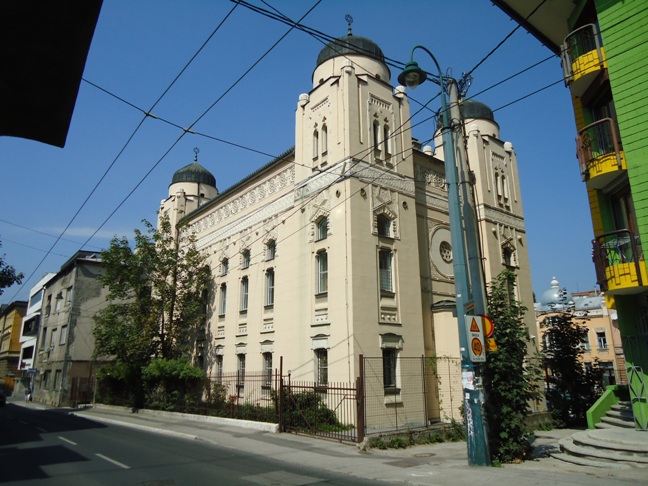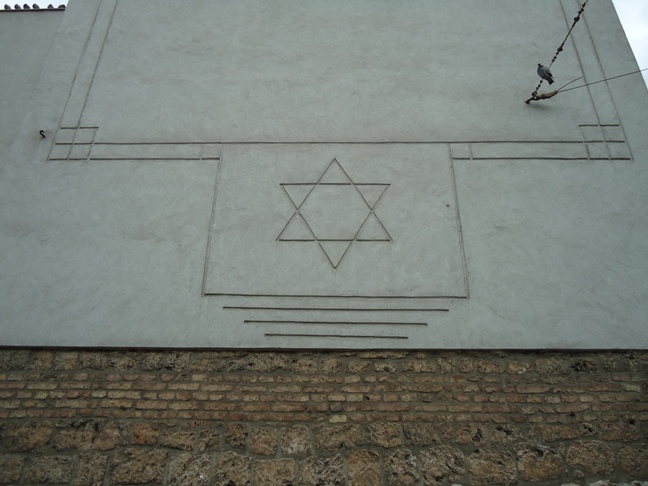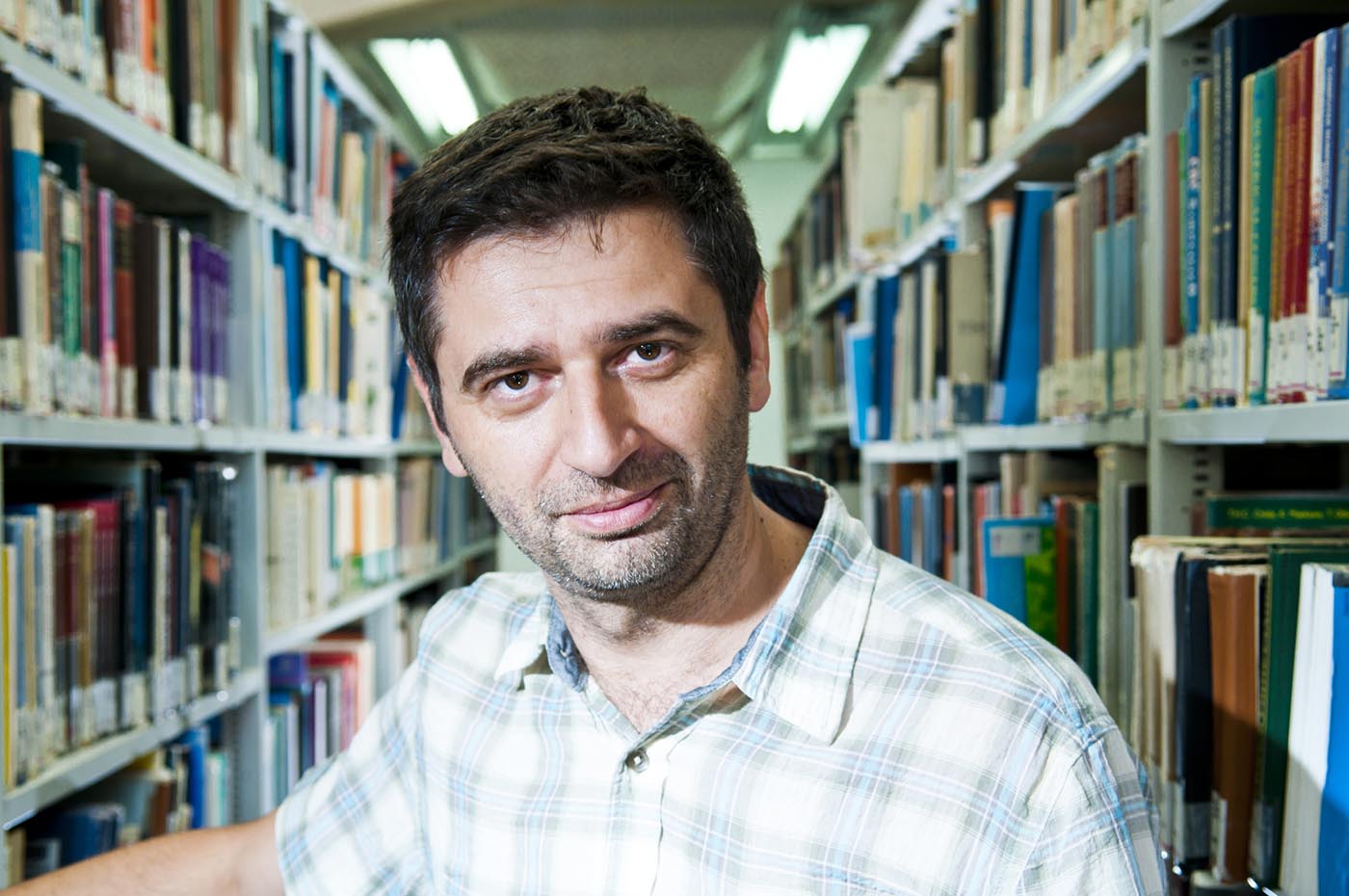
In this week’s long read, Mads Jacobsen explores the Jewish experience in Bosnia-Herzegovina through the eyes of Sarajevo-born Rabbi Eliezer Papo.
“If you imagine Bosnia to be a piece of somun, that piece of bread you eat during Ramadan, you cannot say that Jews are the water of that somun, nor can you say that they are the flour, but you can certainly say that they are the black seeds on the top of it. Now, could a somun survive without it? Yes. Would it still be the same somun? Certainly not. Jews are currently a small percentage of the Bosnian population, but they are an important part of the urban population, and they have contributed a great deal to the country. So, could Bosnia do it without Jews? Yes. Would it still be the same Bosnia? Certainly not”, explained Rabbi Eliezer Papo in an interview with the Post-Conflict Research Center.
This year, the Jewish community in Sarajevo celebrated its 450th anniversary by hosting an international conference in the Ashkenazi Synagogue dedicated to folklore, linguistics, history and the relationship between the Jewish community and other communities. Following this anniversary, Mads Hoeygaard Jacobsen – an intern at the Post-Conflict Research Center – had the chance to interview Sarajevo-born Rabbi Eliezer Papo to talk about the Jewish experience in Bosnia-Herzegovina during the different epochs of the country’s history.
“Every single life is marked by traumatic events,” started Rabbi Papo. “It is very traumatic to be born, and it is probably quite traumatic to die, but in between there is an entire life. Nobody reduces life to those two traumatic events. So, unlike the Jewish experience in many different parts of the world, their experience in Bosnia was a good one.”
The earliest records indicate that Jews had settled in Sarajevo by 1565 and were of the Sephardic branch of Judaism, descendants of Jews who had lived in Spain and Portugal prior to being expelled in 1492.
In order to illustrate to what extent the Sephardic Jews lived a robust existence in Sarajevo during the Ottoman era, the Rabbi pointed to a piece of jurisprudence that the Bosnian Jewish community contributed to the Halakha, or Jewish Law, in those years. On the Sabbath, it is forbidden for a religious Jew to light a fire, so how does one smoke?
“Well,” explained Rabbi Papo, “if on Friday you take a nargilla and fill it with tobacco smoke without taking it into your lungs and then close the lid from both sides, you can use it during the Sabbath without the starting a fire…That’s the way Jews in Sarajevo lived. Think of it, if these were the questions Rabbis dealt with, investing time and effort into inventing a way to smoke on Sabbath, that means all other problems were solved and that life was very good and easy.”
When the Sephardic Jews settled in Bosnia, they fell under the control of the Pact of Umar, a piece of Islamic jurisprudence. This law stated that non-Muslims within the Ottoman Empire would be provided security if they adhered to various strict prohibitions of their religious practices. One of the conditions proclaimed that non-Muslim religious buildings would be permitted to function, but no new buildings were allowed to be built and no repairs were to be made to those already existing. This presented a problem because no synagogues existed in Bosnia prior to the Jewish settlement in the sixteenth century. But the Sephardim soon began negotiations with the Ottoman administrators who, in the words of Rabbi Papo, said:
“OK, you know what? Let us make this profitable for all of us. Our heart hurts when we have to break sharia, so you will have to pay for that.” The Rabbi continued: “If building a synagogue costs a million dollars, it would actually cost two million in the Ottoman Empire because you needed to bribe everybody along the way from Sarajevo, to Travnik, to Istanbul.”
This system continued until the end of the nineteenth century when Bosnia came under the rule of the Austro-Hungarian Empire.

“When Austro-Hungary arrived, things changed from good to better,” explained Rabbi Papo. “I mean, the country was still occupied, but it was more like: goodbye to an old dying empire and hello to something much more enlightened. Jews started to thrive even more as new European concepts of freedom, citizenship, and equality, were brought to the country.”
It was during the Austro-Hungarian occupation that the Sephardic Jews were joined by some of their Ashkenazi brethren who arrived from the Habsburg Empire, even though they had separate houses of worship and language.1
Jewish participation in public and political life during this period was also very high. Jews were freely appointed to various regional and local governments, and in Sarajevo, for example, the Austro-Hungarians established a city council where three to four seats were secured for members of the Jewish community.2
Then came World War One, after which Bosnia became part of the Kingdom of Serbs, Croats and Slovenes, later renamed the Kingdom of Yugoslavia. During this period, the Jewish community in Sarajevo started doing even better. Rabbi Papo explained:
“Sarajevo became the center of a much bigger Jewish community. It became the center of Jewish life for the entire Kingdom of Yugoslavia. How do we know this? When they decided to start building a school for Rabbis, all Yugoslavian Rabbis, it was built in Sarajevo. It was not built in Belgrade, it was not built in Zagreb, it was built in Sarajevo. This is because the leaders of the Jewish community said: ‘Jewish life in Sarajevo is the strongest, and this is the way through which future Rabbis have to pass.’ If you are familiar with Sarajevo you can see how many synagogues were in the city. In fact, every fifth person in Sarajevo during the Kingdom of Yugoslavia was Jewish.”
But things would dramatically change with the coming of the Second World War to Sarajevo in 1941. Bosnia was occupied by Croatia and the flourishing Jewish community was violently stripped of rights, property and even of life itself. First, the Jewish institutions were sacked, then the Jews were barred from economic and political life, and then their organizations were shut down.3
The deportation of Sarajevo’s Jews began on 3 September 1941, and many were transported to the Jasenovac concentration camp, a place from where few survived. Just prior to World War Two, approximately 14,000 Jews lived in Bosnia – 10,000 of them in Sarajevo.4 By August 1942, it is estimated that only 120 Jews were left in Sarajevo.5
During the war, many Jews in Bosnia volunteered for Tito’s Partisan movement because active resistance and “Brotherhood and Unity” seemed like a better alternative than waiting for deportation and death. The toll on Jewish life was high and, when the war ended, around 10,000 Jews in Bosnia.6 were dead or missing, 7,092 of them from Sarajevo. This accounted for 68% of the region’s prewar Jewish population. Likewise, of the 450 Jews who had joined the Partisans or served the Communist party, 316, or 70%, had lost their lives.7
The Jews who survived and remained in Bosnia after World War Two found themselves in Tito’s socialist Yugoslavia. Here, the Jewish community got the chance to get on their feet again. Rabbi Papo explains that, after the war, most Jews were marrying outside their group, likely because of their reduced numbers. As a result, many Serbs, Croats and Muslims were assimilated into the Jewish community. The Rabbi remembers this period:
“Whether the father was Serbian and the mother was Jewish or whether the mother was Croat and the father was Jewish… well, it would be silly to say the kids from mixed marriages felt ‘Jewish’ because everybody was Yugoslavian, but it was cool to be Jewish. Being Jewish meant being urban. Being Jewish meant not being rural. It meant good English and having international contacts. Being Jewish was good.”
These mixed marriages proved important in Sarajevo during the Bosnian War from 1992 to 1995, since the Jewish community of around 2,000 people8 was the only one equally related to the three combating groups.
“Before the war, the community wasn’t aware of its strength; it was a traumatized community of Holocaust survivors,” Rabbi Papo explained. “But the Jews had learned from the last war, and this time they were very organized on a local and world scale. The Jewish community was well connected with all warring parties, and we were able to get help into the city. We were able to bring in supplies from abroad, which we equally distributed to everybody in the city. We were the only group that could make it past Croatian, Serbian, and Muslim control posts,.”
“There were probably others that were able to achieve such things, but being capable does not mean you will do it, so it was something very special to see such a tiny community doing such a big thing.”
The Rabbi remembers one instance during the conflict when a sentence was written on the Jewish community’s building in Sarajevo. It was a sentence that the Rabbi believes expressed exactly what the city was feeling at the time: “Kikes are Saving the City,” it ironically read. “I like it actually,” Rabbi Papo commented. “Although I do not like the word, I do like the saying.” 1,500 Jews were evacuated during the conflict, and today there are around 500 Jews left in Bosnia.9

With the end of the war and the signing of the Dayton Agreement a new problem arose. Jews, along with other ethnic minorities, were not recognized in the constitution as a constituent people, meaning they could not be elected to Bosnia’s House of Peoples.
Jakob Finci, who is considered the de facto leader of the Jewish community in Bosnia, brought the case to the European Court of Human Rights in 2009 in Sejdić-Finci v. Bosnia and Herzegovina. Although the court voted in Finci’s favor, the reforms that aim to change this point in the constitution remain in limbo.
When asked about his personal position on the matter, Rabbi Papo explained:
“I remain ambivalent on this issue. On the one hand, I think that Jews, after living in Sarajevo for 450 years, are entitled to run this country just as anybody else who is born here is. On the other hand, I would not want the Jewish community to be recognized as cooperating with one national group against two others to undermine Dayton. Personally, I would not have pressed charges, not because Dayton is a sacred cow, but because Bosniak Muslims are pushing strongly for constitutional reform towards centralization of the country, and I do not believe Jews should play into their hands.”
Nonetheless, Rabbi Papo believes that Jews would probably do a good job running Bosnia by pointing out that during his tenure Emerik Blum, the Jewish mayor of Sarajevo from 1981 to 1983, greatly contributed to the city’s prosperity.
Rabbi Papo is planning another conference in Sarajevo that is likely to take place in the summer of 2016. The theme of this event: “The Great War and Jewish Literatures.” The assassination of the Austro-Hungarian heir to the throne Archduke Franz Ferdinand by Gavrilo Princip in 1914 makes Sarajevo a fitting location for conversations about World War One.
450 years ago, Jewish life in Sarajevo began after the Jewish community’s traumatic expulsion from the Iberian Peninsula. The Jews experienced 400 years of prosperity under the rule of various empires and kingdoms until tragedy again struck the community during World War Two and the Croatian occupation from 1941 to 1945. Then, from 1992 to 1995, despite being fragmented and few in number, the community managed to unite, using its full capacity to aid suffering civilians in war-torn Bosnia.
1 Donia, Robert J. 2006. “Sarajevo: A Biography”, paperback edition from 2009. London: C. Hurst & Co. Ltd.
2 Ibid.
3 Ibid.
4 European Jewish Congress. n.d. “The Jewish Community of Bosnia-Herzegovina”. [online] Available at: http://www.eurojewcong.org/communities/bosnia-herzegovina.html
5 Donia, Robert J. 2006. “Sarajevo: A Biography”, paperback edition from 2009. London: C. Hurst & Co. Ltd.
6 European Jewish Congress. n.d. “The Jewish Community of Bosnia-Herzegovina”. [online] Available at: http://www.eurojewcong.org/communities/bosnia-herzegovina.html
7 Donia, Robert J. 2006. “Sarajevo: A Biography”, paperback edition from 2009. London: C. Hurst & Co. Ltd.
8 European Jewish Congress. n.d. “The Jewish Community of Bosnia-Herzegovina”. [online] Available at: http://www.eurojewcong.org/communities/bosnia-herzegovina.html
9 Ibid.







Ella
Thank you for this interesting and well written article; on the same theme, the great stories by Gorazde-born writer and playwright Isak Samokovlija tell the everyday lives of the Sefardi community in Sarajevo at the turn of the 20th century… A must read if you’re interested in the subject.
Omer Suleimanagich
The Jewish community and its members made a VERY big impact in the region!
Moshe Pijada, Josip Broz Tito’s mentor and author of Socialist Yugoslavia’s constitution, Emerik Blum founder of Energoinvest and one of the most influential individuals to Sarajevo and Bosnia, and Sven Alkalaj first Bosnian Ambassador to the US, representing Bosnia-Herzegovina
These are just a handful of the many individuals who made their mark on the region